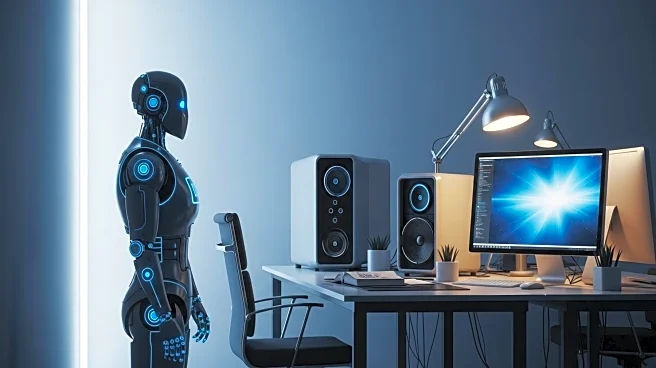What is the story about?
What's Happening?
Nvidia CEO Jensen Huang has expressed his views on the future impact of AI and robotics on human workload, suggesting that advancements in these technologies will make humans busier rather than providing more leisure time. During an appearance on Fox Business, Huang discussed the potential for AI to revolutionize various industries, including healthcare, manufacturing, and agriculture, through the use of robotic systems. He emphasized that while productivity gains are expected, humans will likely have more work due to the increased efficiency and the ability to pursue new ideas. Huang also touched on the historical context of workweek changes, noting that while a four-day workweek could be possible, the future will likely involve more work due to the rapid pace of technological advancements.
Why It's Important?
The insights shared by Huang highlight the significant role AI and robotics are expected to play in shaping the future of work and productivity. As industries increasingly adopt these technologies, there could be substantial shifts in job structures and economic growth. While some jobs may be eliminated, new opportunities are likely to emerge, potentially leading to increased GDP and improved quality of life. However, Huang's perspective challenges the notion that AI will lead to more leisure time, suggesting instead that humans will need to adapt to a faster-paced work environment. This has implications for policymakers, businesses, and workers as they navigate the evolving landscape of AI-driven productivity.
What's Next?
As AI and robotics continue to advance, industries will need to prepare for the integration of these technologies into their operations. Companies may need to invest in training and development to equip their workforce with the skills necessary to thrive in an AI-driven environment. Policymakers might also consider the implications of these changes on labor laws and workweek structures. The ongoing dialogue about AI's impact on work and productivity will likely influence future economic and social policies, as stakeholders seek to balance technological progress with human well-being.
Beyond the Headlines
The discussion around AI and robotics also raises ethical and cultural questions about the future of work. As automation becomes more prevalent, there may be concerns about job displacement and the need for equitable access to new opportunities. Additionally, the cultural shift towards a more technology-driven society could impact social interactions and the way people perceive work-life balance. These considerations will be crucial as society adapts to the transformative effects of AI.















